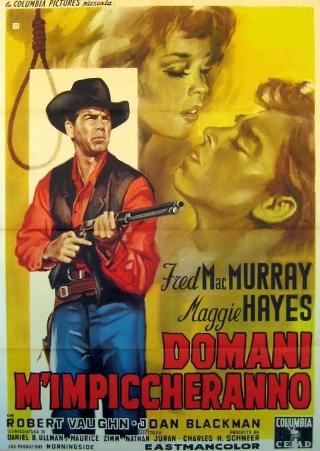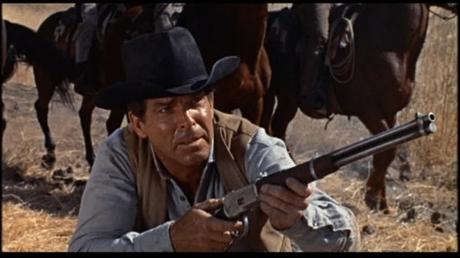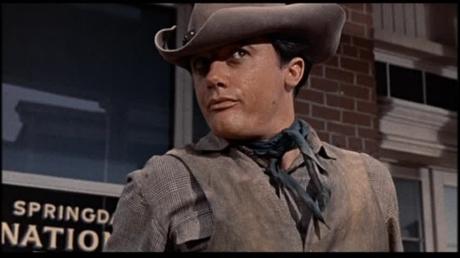
Since when is a young rattlesnake any less poisonous than an old one?
First and foremost, a good film needs to be entertaining. The more interesting ones ask questions and have a clear theme which dominates the plot. For this viewer, the theme is always important as it indicates the direction the picture is likely to take. As such, I’m always a little disappointed when the theme is underdeveloped or poorly developed. One is left wondering what point the filmmakers are trying to make, what their position really is. Good Day for a Hanging (1959) is an example of this, suggesting that it’s going to offer a critique of justice and the death penalty. However, it loses focus and ends up being neither fish nor fowl, dragging our sympathies in one direction before wrong-footing us and apparently contradicting the line it was initially following.
Ben Cutler (Fred MacMurray) is an ex-lawman living in an idyllic Nebraska town. He’s a widower with a grown-up daughter and only weeks away from marrying Ruth Granger (Maggie Hayes), another single parent. His plans for a peaceful domestic future are thrown into disarray though by the arrival of a five man gang intent on robbing the bank. The heist doesn’t go entirely smoothly, resulting in a shoot-out and pursuit with a hastily assembled posse. The upshot of all this is the aging marshal (Emile Meyer) ends up dead, and the man accused of killing him is a former resident of the town, Eddie Campbell (Robert Vaughn). Cutler manages to wound Campbell and bring him back to town for trial, although the situation is complicated by the fact his daughter (Joan Blackman) was the outlaw’s childhood sweetheart and still carries a torch for him. Well the trial comes to pass, and Campbell ends up convicted of murder and sentenced to hang, principally on the evidence of Cutler who has been drafted in as a replacement marshal due to his previous experience. Throughout it all Campbell maintains his innocence with the support of Cutler’s daughter, who refuses to believe her former love capable of murder. As Campbell’s date with the gallows approaches the discontent within the town grows – Cutler’s isolation also increases as first his daughter, then his betrothed, and finally the citizenry turn their back on him and question his judgment and motives.

Nathan Juran is best known now for his science fiction and fantasy movies but he directed a number of pretty good westerns, notably with Audie Murphy. Good Day for a Hanging was a low-budget affair (recycling the score from 3:10 to Yuma throughout), resembling a TV western in some respects but quite competently handled by Juran. The opening quarter-hour is pretty stylish and tense as the build up to and execution of the bank robbery take place, Juran alternating nicely between wide shots and telling close-ups. The truth is the direction remains smooth all the way and the climactic shoot-out is well done. The script, however, is less satisfactory. One is left with the impression that the writers were unsure or undecided what point they wanted to press home. On the one hand, the whole movie seems to be building towards a condemnation of the death penalty, but then changes tack for the climax. There also seems to be that typical 50s concern with disaffected youth, but again the payoff is at odds with the end result. And then there’s the character of Cutler – the inner conflict of a man of principle is certainly explored, but he’s portrayed as such an implacable and frankly unsympathetic figure that even that doesn’t really hit the mark. All of this amounts to a very average western, and you can’t help but feel let down when you think of the creative and thematic heights the genre had reached by the end of the 50s.
Generally, I like Fred MacMurray in westerns, although I understand he wasn’t all that enthusiastic about doing them. His best roles always had a touch of ambiguity about them, and those where he was downright unsympathetic were probably the strongest. As Cutler, he had the opportunity to play to his strengths, his unbending conviction on the outside causing plenty of internal turmoil. For long stretches it’s hard not to see him as the villain of sorts, apparently oblivious to the mounting pressure from family, friends and community. But I’m not totally convinced that’s how we’re supposed to view him. Once again, I feel the writing is fault here rather than MacMurray – we’re encouraged to see him as others do as opposed to how he sees himself. And then there’s an element of unreality to it all; would any man honestly jeopardize his relations with those closest to him, those he genuinely loves, for what is at best a highly debatable principle? Pitted against him was Robert Vaughn, a man whose place in western lore was just a year away from being cemented in John Sturges’ The Magnificent Seven, but who would find his true niche in TV, particularly as The Man from U.N.C.L.E. He’s fine as the troubled youth as far as it goes, but I feel he suffers from the confused scripting too. The supporting cast features, Emile Meyer, Maggie Hayes, Joan Blackman, Denver Pyle and The Virginian, James Drury, all in perfectly acceptable if unremarkable roles.

Good Day for a Hanging was released some time ago in the US by Columbia – TriStar on DVD and should be easily available. The transfer to disc is OK, but nothing more. It’s in the correct widescreen ratio and doesn’t display any noticeable damage, but it’s a lackluster affair for all that. The image is a bit dull and faded, mediocre at best. Even so, this is the kind of film that’s unlikely to have a lot of care lavished on it so I’m happy enough to have it available in acceptable form. Have i been unduly harsh in my overall assessment? Perhaps, and others may disagree. For me, context is the key here; 1959 saw the release of some of the best films the western genre had to offer, and Good Day for a Hanging looks weak when set against them. I don’t think it’s a bad movie, MacMurray and Vaughn are very watchable and Juran does all that’s asked of him, but it promises a lot more than it ultimately delivers.
